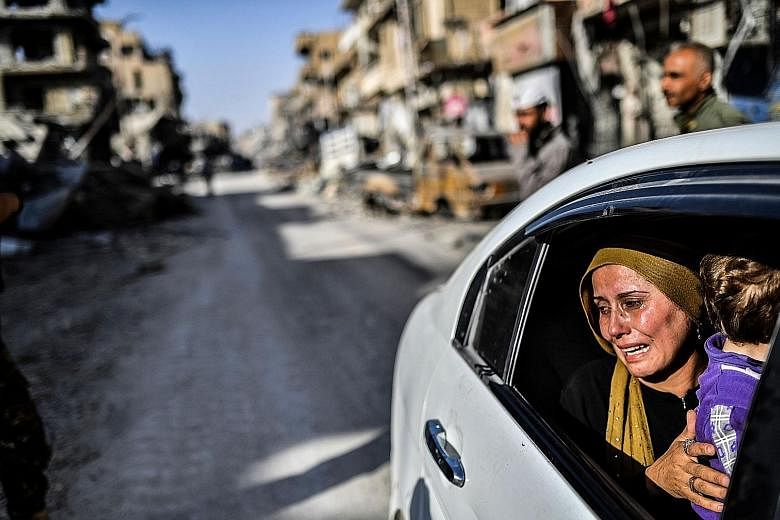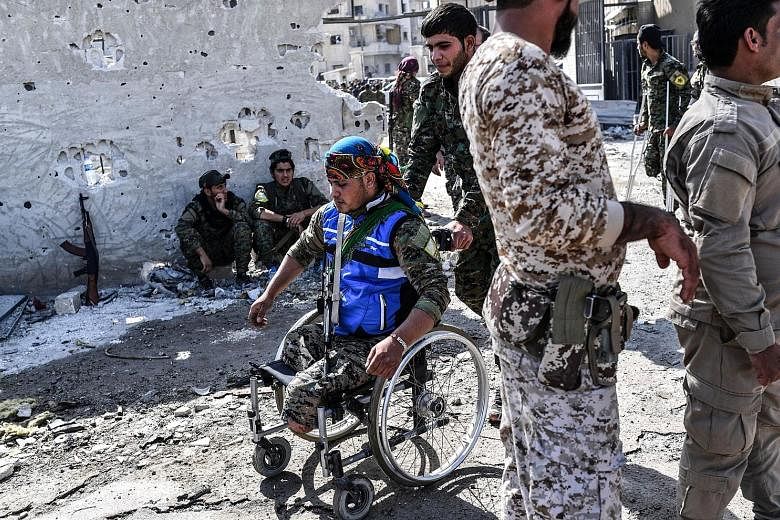The fall of Raqqa and the defeat of militants in Marawi might have dealt a major blow to the Islamic State in Iraq and Syria (ISIS), but Asian capitals should not let their guard down, according to counter-terrorism experts.
The militant group is down but not out, and the "spillover" from these defeats will likely result in new and more insidious forms of violent terrorism which security forces across Asia will have to grapple with, they add.
Last week, a months-long battle against pro-ISIS militants in the southern Philippine city of Marawi was effectively won by Philippine security forces after the deaths of the rebels' three remaining leaders.
That came just days after a coalition of Arab and Kurdish militias backed by the United States captured Raqqa in Syria from ISIS.
But ISIS fighters are already regrouping and re-arming in remote areas in Syria and Iraq. Hundreds are fleeing south to these areas.
"The contours of ISIS activity will shift, as fighting winds down," Ms Sidney Jones, director of the Jakarta-based Institute for Policy Analysis of Conflict, wrote in a report for the Lowy Institute, a think-tank in Australia.
ISIS fighters and leaders who came from South Asia or South-east Asia are also expected to head home.
For instance, two Indonesians who commanded Khatibah Nusantara, a combat unit consisting of militants recruited from all over Asia, reportedly survived the final assault by US-backed Kurdish and Arab militias on Raqqa. They fled to Deir Ezzor in Syria, and were attempting a return, most likely to the insurgency-wracked southern Philippine island of Mindanao.
"If one of these two men make it back, it will ensure a high level of interest of Indonesian extremists in joining their ranks," said Ms Jones.
MILITANTS WEAKENED
With its recent losses, ISIS no longer has the manpower or means to seize another city in Asia like Marawi, home to more than 200,000, roughly the size of Raqqa.
"By and large, there remains a threat from this group, but not on the magnitude we've seen in the Middle East, or scale we confronted in Marawi," Philippine military spokesman Restituto Padilla said last week.
The war in Marawi had cost ISIS its "emir" in South-east Asia, Filipino militant Isnilon Hapilon, a charismatic Arab-speaking preacher. He steered a faction of the Abu Sayyaf, a small but brutal group of extremists known more for kidnapping and banditry, under the Islamic State's wings.
Also possibly killed in Marawi was former university lecturer Mahmud Ahmad, who had been funnelling fighters to Mindanao, and linking up militant factions in Malaysia, Indonesia and the Philippines.
The fall of Raqqa, meanwhile, has cut funding for ISIS' sprawling network of operatives and fighters in South-east Asia.
STILL LETHAL
The defeats, however, do not make ISIS any less dangerous.
Bangkok-based analyst Anthony Davis, of defence publishing group Jane's, called Marawi "a species of victory for the jihadist cause".
"This was five months during which they successfully held off a much more powerful opponent and gained a huge and protracted propaganda windfall," he said.
ISIS training camps in the jungles of Mindanao are still intact. Stragglers from Marawi are fleeing south to areas in Maguindanao and North Cotabato provinces controlled by the Bangsamoro Islamic Freedom Fighters, which has pledged allegiance to ISIS.
Fighters from Iraq, Malaysia, Indonesia and Singapore are converging on these enclaves, according to a report by the Terrorism Research and Analysis Consortium on online news site Rappler.
In Indonesia, nearly all provinces are said to have "sleeper cells". A Washington think-tank keeps tabs on at least 20 ISIS-linked groups, including Jemaah Islamiah splinters.
Another worry is that younger and more dangerous extremists are poised to fill the void left by the loss of Hapilon and Mahmud.
Two "high-value terrorists" - Malaysians Mohammad Amin Baco, 31, and Muhammad Joraimee Awang Raimee, 42, - are still active in Mindanao, according to security expert Rommel Banlaoi, director of the Centre for Intelligence and National Security Studies.
They are said to be a bigger threat than Mahmud, seen more as an ideologue and organiser than a battlefield commander, because of their bomb-making skills and experience in fighting a guerilla war.
Ms Jones said Hapilon's No. 2, Furuji Indama, would likely assume leadership of the Abu Sayyaf in Basilan province.
REGROUP AND REBUILD
After the debacle in Marawi, counter terrorism officials expect ISIS-inspired groups in Mindanao to refocus on fighting a guerilla war, as they try to rebuild their networks in the Philippines, Indonesia and Malaysia.
Ms Jones warned of "retaliatory bombings" in big urban areas in the Philippines, including the capital Manila, and Davao, Cotabato and Zamboanga in Mindanao. Philippine embassies could also be targeted, she said.
The Abu Sayyaf may go back to kidnapping foreigners in retaliation against Hapilon's death.
It is not just the Philippines, but other countries in the region may also be at risk. Sleeper cells may plan suicide attacks against civilians across South-east Asia.
The fall of Marawi and Raqqa may inspire "lone-wolf attacks", which officials concede they have almost no way of stopping.
A sense of rage across the Muslim world over the violence committed on Rohingya Muslims in Myanmar's Rakhine state could fuel attacks. Intelligence officials have linked some Rohingya in India to ISIS and flagged concerns that they may carry out terror attacks in the country.
STEPPING UP SECURITY
In response to the threats, security officials in the region have been tightening their nations' borders to stem the flow of returning militants from Syria and Iraq, and those jumping between Mindanao and Sabah.
They are also trying to starve terrorists of funding by keeping a lid on militant remittances.
Indonesia, Malaysia and the Philippines have been jointly patrolling terrorist-plagued waters off Sulu archipelago in Mindanao and Sabah. They recently agreed to beef this up with joint air patrols.
Malaysia's Deputy Home Minister Nur Jazlan Mohamed told The Straits Times counterterrorism officials are looking to deal further blows against militant networks in this "period of disarray".
"Currently, the recruitment in Malaysia is largely digital, so we can and should do further work to cripple them," he said.
Malaysia has arrested about 40 militants trying to slip across its borders so far this year, including nine from the Philippines purportedly sent by Mahmud to form a sleeper cell in Sabah.
ISIS remains a threat, experts and officials stressed.
Datuk Nur Jazlan said: "Even though they are silenced for the moment, it doesn't mean they won't regroup and rejuvenate."
Similarly, Mr Davis said the defeat of the militants in Marawi "certainly does not mean the end of the jihadist insurgency in the region".
• Additional reporting by Francis Chan in Jakarta, Tan Hui Yee in Bangkok, Shannon Teoh in Kuala Lumpur


